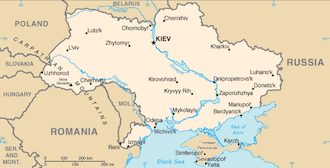On the precipice of a full-scale civil war, international mediators are pushing hard for a new round of Ukrainian peace talks which seem unlikely to happen at all, and even less likely to result in any sort of deal.
 The efforts are mostly centering around the April Geneva talks, which ended in a joint agreement to refrain from violence, which everyone spun as vindication, and which the interim government interpreted as an international casus belli to attack the east and impose “law and order” on the area.
The efforts are mostly centering around the April Geneva talks, which ended in a joint agreement to refrain from violence, which everyone spun as vindication, and which the interim government interpreted as an international casus belli to attack the east and impose “law and order” on the area.
The protesters weren’t welcome at the April talks, and leaders in the interim government suggest they never will be, with top presidential candidate and “Chocolate King” Petro Poroshenko insisting force is the only thing the ethnic Russian “terrorists” understand.
The position is not unique in the post-regime change political spectrum of Ukraine, where the “moderates” advocate violent conquest of the east as the reasonable alternative to neo-Nazi linked factions and even some mainstream officials openly talking about massacring the ethnic Russian minority.
Even with the return to conscription, Ukraine’s ramshackle military doesn’t seem up to the task of conquering the east in either way in any sort of short order, and that means in the absence of talks only a steady escalation of violence.


